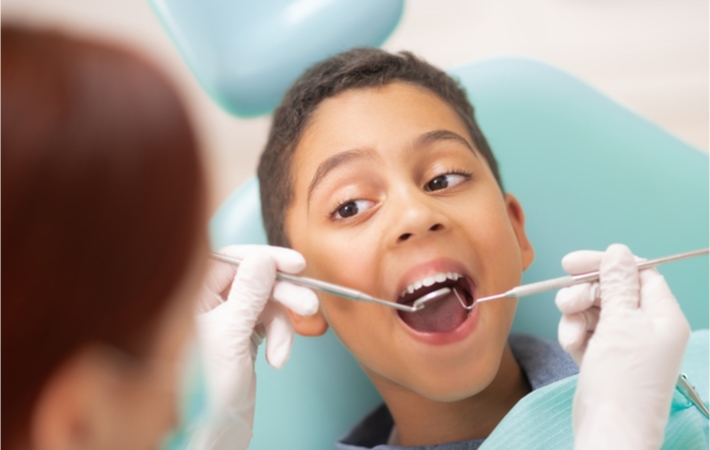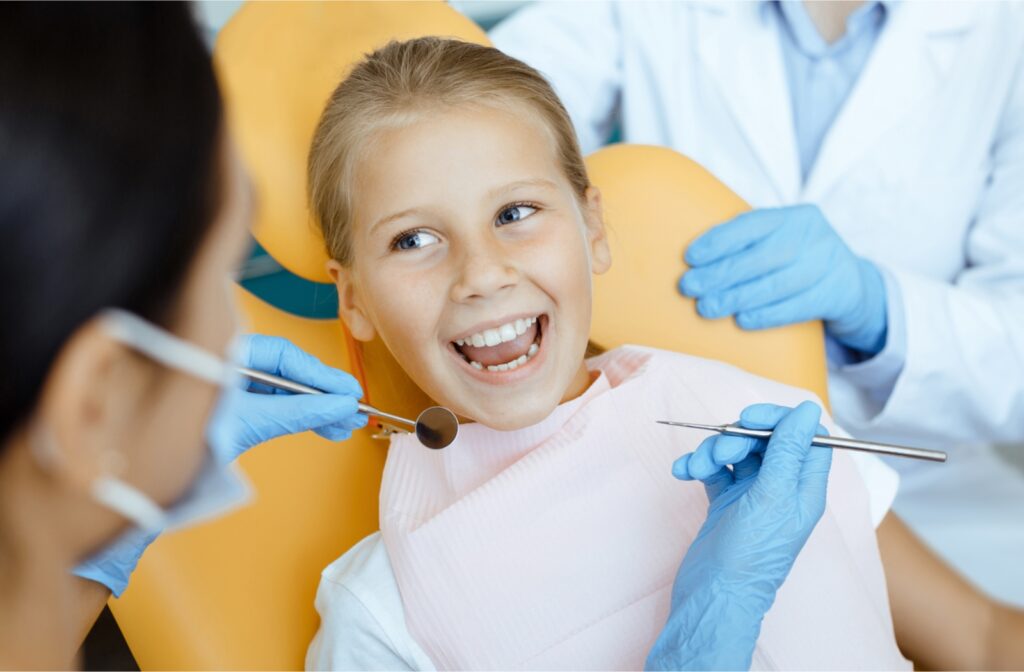How Often Should Kids Go to the Dentist?
Most adults are familiar with going to the dentist twice a year. But do you remember when you first started visiting your dentist? If you have a young child at home this question is an important one.
Taking care of baby teeth is just as important as adult oral hygiene. Once a child has teeth, there are benefits to seeing the dentist regularly. Let’s discuss what sort of schedule you should set for your kids and why consistent visits are important.
And if your child is experiencing dental issues or tooth pain, it’s always best to have them looked at right away by dental professionals.
Your Baby’s First Dental Visit
A trip to the dentist is a part of any healthy infant’s early stages. Once an infant’s teeth start to grow in, they will soon need the attention of a dentist. The first teeth that grow in are called primary teeth, or baby teeth. These teeth will eventually be replaced, but caring for them is just as important as cleaning adult teeth.
Your baby’s first visit to the dentist should occur:
- 6 months after the first tooth starts to grow in
OR
- At 1 year of age, whichever comes first
Make sure to monitor your child’s tooth development and record when the first tooth begins to erupt through the gums.
Dental Visit Frequency for Children
After your child’s first visit, going to the dentist becomes a regular routine. The Canadian Dental Association (CDA) recommends that:
- Children should visit the dentist every 6 months after their first dental exam
This pattern should be followed for the rest of their lives. Bi-annual dental exams and cleanings are part of a healthy oral care routine for adults, too.
Why Visits to the Dentist are Important
Going to the dentist regularly has several benefits for young people. It’s not just about finding cavities. During a pediatric dental exam, a dentist can:
- Check for dental problems and prevent bigger issues
- Ensure your cleaning routine is sufficient
- Create a healthy relationship between your child and oral care
Early Tooth Decay
Early tooth decay is something that can happen when primary teeth are not cared for properly. You might be thinking: these teeth just fall out, what’s the big deal? Just like permanent teeth that experience tooth decay, baby teeth with cavities can lead to bigger problems.
Early childhood tooth decay is often caused by too much sugar in your kid’s diet. This can happen to children up to the age of 4. As your child ages, periodically check under their gums for signs of decay. Look for:
- Dull white spots
- Lines on their teeth close to the gums
- Dark teeth
If you do notice signs of decay, it’s important to book a dental appointment right away.

Make Sure Oral Hygiene is Good
Convincing your kids to brush their teeth every morning and night can be challenging. We know that! But no matter how big the struggle is, it’s important they clean their teeth every day. The CDA recommends that all children:
- Brush twice a day (morning & night) for at least 2 minutes
- Floss every day
A healthy diet and good nutrition are also part of good oral hygiene. During a children’s dental exam, your dentist can make sure that the right steps are being taken at home and your child’s mouth is healthy.
Check for Dental Crowding
Some kids’ teeth grow crooked or crowded. In most cases, this can be remedied when a dentist notices it early. It’s common for the teeth to straighten as others erupt and a full set becomes present.
But for some children, this will lead to bite problems and other complications. When a dentist is seeing your child every 6 months they are aware of your child’s development and can recommend an orthodontist if necessary.
Educate Your Child
The idea of a doctor stuffing tools into your mouth can be very intimidating for a young person. But as we all come to learn, a trip to the dentist is generally a very comfortable painless experience. Part of why your child needs to see the dentist regularly is to create a culture of healthy oral care.
Beyond understanding that the dentist is their friend and there to help, regular visits teach children that great oral hygiene has positive outcomes. And when combined with regular appointments each year, your child will learn they can stay cavity-free.
After Adult Teeth Grow In
Children typically see their permanent teeth (adult teeth) grow in between the ages of 6-7. The first to erupt are the rear molars which will not usually displace any primary teeth. Through the next several months, new teeth will continue to grow in and their baby teeth will fall out.
Through this period, children need to be visiting the dentist every 6 months. This ensures that there are no complications during the transition from baby to adult teeth. Some pain is normal during this stage but excessive discomfort should be addressed by a dentist.
If your child is experiencing discomfort:
DO
- Rub the gums with a clean finger.
- Massage the gums with a cool spoon.
- Seek an over-the-counter medicine from your dentist or doctor.
DO NOT
- Apply topical painkillers on the gums.
- Give your child teething biscuits.
- Ignore a fever or other symptoms. New teeth growing in should not make your child sick.
Good Dental Habits for Life
From their very first visit before they turn 1 year old until the later stages of life, your child should be seeing the dentist twice a year. Regular dental exams and cleanings are essential for healthy teeth and the prevention of tooth decay, gum disease, and other periodontal problems.
Dentists can prevent small issues from becoming worse and know how to recognize the first signs of overcrowding or orthodontic irregularities. So schedule your kid’s next dental exam and make sure you are helping them live a healthy life.



